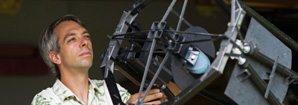MacArthur Fellows Speaker Series: Olivier Guyon

Dr. Olivier Guyon, Department of Astronomy and College of Optical Sciences, MacArthur Fellow Class of 2012, will speak Feb 26 at the MacArthur Fellows Speaker Series.
The UA Graduate Center is proud to present the MacArthur Fellows Speaker Series. The University of Arizona is home to several recipients of the prestigious MacArthur Fellowship, an initiative of the MacArthur Foundation, which awards individuals that exemplify exceptional creativity, significant accomplishment, and boundless potential. From neuroscience and astronomy to linguistics, ethnobotany, and anthropology, the UA’s MacArthur Fellows are changing the world for the better. This speaker series explores and celebrates the innovation and impact of our MacArthur Fellows’ work.
Location: Cesar E. Chavez Building, Room 111, 1110 E James E Rogers Way
When: February 26
Time: 5:30 - 6:30 PM
Free and open to the public. Light refreshments and hors d'oeuvres will be served.
Title: Observing Exoplanets and Looking for Life around other Stars
Abstract: The first exoplanet around a Sun-like stars was identified 20yr ago, and we are now finding exoplanets at an accelerating pace thanks to recent technological advances. In the last years, astronomers have found that potentially habitable planets (rocky planets about as massive as Earth, located at the right distance from their host star to sustain liquid water) are abundant, with one such planet around 10% to 50% of stars. Finding and studying habitable planets around nearby stars is a formidable challenge, but is rapidly becoming possible, with both space-based telescopes free of atmospheric disturbances and the upcoming generation of extremely large telescopes on the ground. To directly image and study habitable planets around nearby stars requires exotic optical systems, tuned to reject the bright starlight to observe a planet millions to billions times fainter. I will show how such systems are using new optics tricks, and are now coming online. I will also briefly introduce project PANOPTES, a citizen science effort to crowdsource exoplanet finding using a network of small robotic wide field cameras. Project PANOPTES, soon to be launched, will enable schools, amateur astronomers and citizen scientists to discover with small cameras exoplanets that will then be studied with the largest space and ground telescopes.
Photo: MacArthur Foundation

For Public
Public events include our Monday Night Lecture Series, world-reknowned Astronomy Camp and Mt Lemmon Sky Center.

For Students
A good place to start if you want to become an undergrad major or grad student, or need to find our schedule of classes.

For Scientists
Find telescopes and instruments, telescope time applications, staff and mountain contacts, and faculty and staff scientific interests.




